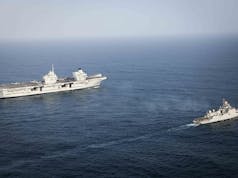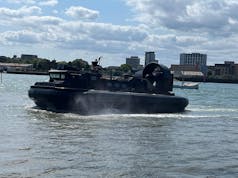The Royal Navy’s Coastal Forces Squadron has been awarded the Firmin Sword of Peace, the highest collective award in the UK Armed Forces for humanitarian and lifesaving efforts, according to an official announcement by the Royal Navy.
This recognition highlights the squadron’s critical role in managing the challenging small boats mission in the English Channel.
The Portsmouth-based squadron, responsible for the operations of 16 P2000 fast patrol boats, has previously received this honour twice.
This latest recognition comes after their 14-month operation, codenamed Isotrope, during which they supported broader government efforts led by the Home Office to manage migrant crossings in the Dover Strait.
Throughout this period, the squadron maintained a constant presence in one of the world’s busiest shipping lanes, significantly increasing their operational tempo. They deployed six vessels at any one time to ensure the safety of navigation and recover migrants attempting to reach the UK, often in collaboration with the Maritime Coastguard Agency and RNLI.
Commander Richard Skelton, the squadron’s Commanding Officer, praised the efforts of his team in the announcement, stating that their work during the operation was “a credit to every member of the squadron.” He noted the challenges faced, particularly in maintaining the boats’ operational readiness under difficult conditions: “The requirement to keep six boats available at short notice was a tremendous engineering challenge – and one which we met, delivering 99 per cent availability in demanding conditions.”
The Firmin Sword of Peace, presented by Britain’s oldest sword-making company, is awarded to the military unit or establishment judged to have made the most valuable contribution to humanitarian activities. Rear Admiral Rob Pedre, Commander UK Strike Force, formally presented the award to Commander Skelton aboard HMS Victory.
Chief Petty Officer Dean Reed, Marine Engineering Officer on HMS Trumpeter, also reflected on the operation’s difficulties in the announcement, saying: “It was a really tough period, operating in all weathers. Keeping the boats at the required readiness away from our logistics and engineering hubs was a real challenge.”
The Coastal Forces Squadron’s involvement in Operation Isotrope marks a significant shift in their mission, moving from primarily training-focused duties to more operationally focused missions.
Their work extends beyond UK waters, with recent deployments as far afield as the Norwegian Arctic, the Baltic’s Gulf of Riga, and even Paris, where they supported Anglo-French relations and commemorations for the 80th anniversary of D-Day.
The Firmin Sword of Peace has been awarded for nearly 60 years, recognising exceptional contributions to humanitarian efforts by military units.














They’re all we’ve got!
Very well deserved and It’s great to see such recognition.
If they were in the channel why weren’t they turning them back
It was great to see the P2000s moored up in Ramsgate. Well done chaps and chapess!
The good work they have done should not be undermined by the stupid comment made by the then chair of the commons defence select committee Tobias Elwood when he said ‘that is not what the Navy is for’!
Excuse my ignorance but what does “manage the small boat crossings” mean? Were they tasked to prevent illegal incursions into UK waters? If so they don’t appear to have been very successful.